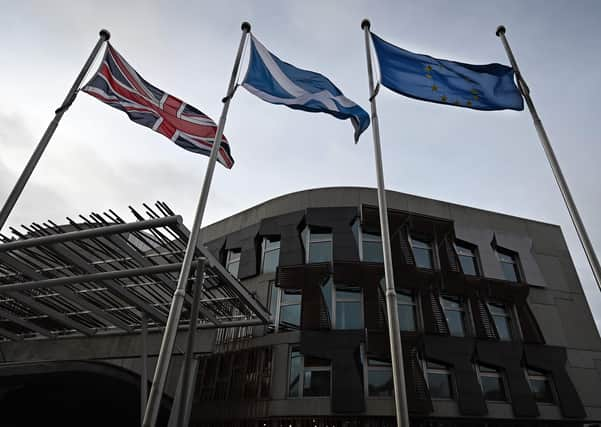MSPs could act now to thwart Brexit Bill, says Treasury chief


Treasury Chief Secretary Stephen Barclay yesterday said any laws on food standard regulations enacted in Scotland before the Bill is approved by the House of Commons would only have to comply with current EU legislation to be enforceable, opening the way for the Scottish Government to introduce urgent restrictions.
However, the Scottish Government said that, while it would look at “every option”, it rejected the suggestion that introducing laws would ensure high standards in Scotland, claiming that the Bill could be applied retrospectively, which could even void laws such as minimum unit pricing on alcohol.
Advertisement
Hide AdAdvertisement
Hide AdScrutiny of the Internal Market Bill, which the UK government claims will ensure there are no trade barriers between the four nations of the UK after the transition period of leaving the EU ends, is due to begin in the Commons today.
However, the SNP, Liberal Democrats, Plaid Cymru, SDLP, Greens and Alliance Party have lodged an amendment, stating that the Bill “breaks international law and is contrary to the established devolution settlement”, which would derail the second reading.
As well as the row over the Bill’s provisions for Northern Ireland, which the UK government has admitted would break international law, the Scottish Government fears it drives a “coach and horses” through other areas of the devolution settlement, particularly on food standards, and could usher in the “creeping privatisation” of Scotland’s NHS and water services.
The UK government says the Bill is based on “mutual recognition provisions” to ensure that any goods which are legally sold in one part of the UK can be sold in all other constituent parts, and there is no discrimination between countries. However, if one part of the UK requires certain standards to be met before a product can be sold, this will not apply to goods coming from other parts of the UK – unless the required standards are already in force before the Bill comes into law.
Concerns have been raised about chlorine-washed chicken and hormone-injected beef flooding supermarket shelves after trade deals are struck with other countries, particularly the US, but Mr Barclay’s statement suggests devolved governments could act now to ensure these products could not be sold. However, while he stressed the UK government had no intention of reducing food standards, he would not give a categorical assurance that chlorinated chicken would not be imported.
“I’m not saying it could happen,” he said. “I’ve been clear we will maintain high standards and that includes any chicken sold is fit for purpose and maintains high standards.
“The Bill is about ensuring that across the UK, businesses that trade together – and for Scottish business the UK is the key market – have high standards.”
Asked if the Scottish Government could introduce legislation before the Bill is passed to prevent the sale of such food, he said: “We’re still in the transition period and so any legislation rushed through would need to comply with EU legislation, so the devil would be in the detail. It’s important that across the UK we maintain high food standards and address the scare stories put out to worry the public.”
Advertisement
Hide AdAdvertisement
Hide AdThe Scottish Government has already written to UK Business Secretary Alok Sharma, warning that the Internal Market Bill would jeopardise Scotland’s food and drink sector.
A Scottish Government spokesperson said: “We are determined that Scotland should maintain existing high standards, comparable to the EU, in areas like food standards and environmental protection. However, the UK Government’s Internal Market Bill would undermine this – it would force Scotland to accept lower standards set elsewhere, regardless of the views of the Scottish Parliament, or the people it represents.
“The proposed UK regime could mean that we were forced to accept market access requirements set elsewhere in the UK, rendering – even retrospectively – the choices of the Scottish Parliament on matters like minimum unit pricing meaningless. The scope of the Bill can be changed at any time at the whim of UK ministers, not the Scottish Parliament.”
Asked if that meant bringing in legislation, she added: “We will explore every option to stop the UK government enacting a law that presents a clear and present danger to the devolution settlement.”
SNP Westminster leader Ian Blackford said the Bill could open Scotland’s NHS and water up to “creeping privatisation”. He said: “The whole thrust of Boris Johnson’s Bill is to restrict devolved policy choices and impose Westminster decisions on Scotland. It includes a Trojan Horse clause to allow Tory ministers to encroach in the future even further on devolution against the will of the Scottish Parliament.
“This Bill must be stopped in its tracks. The Tory government has proven time and again that it cannot be trusted.”
Comments
Want to join the conversation? Please or to comment on this article.